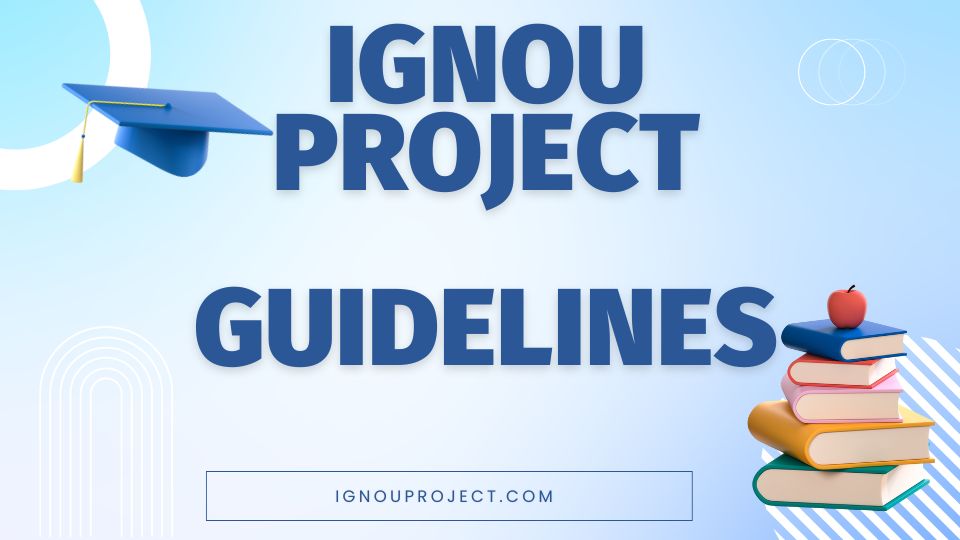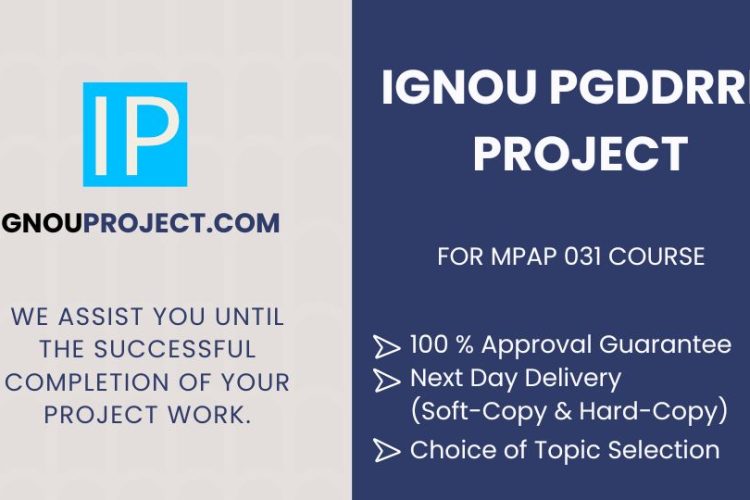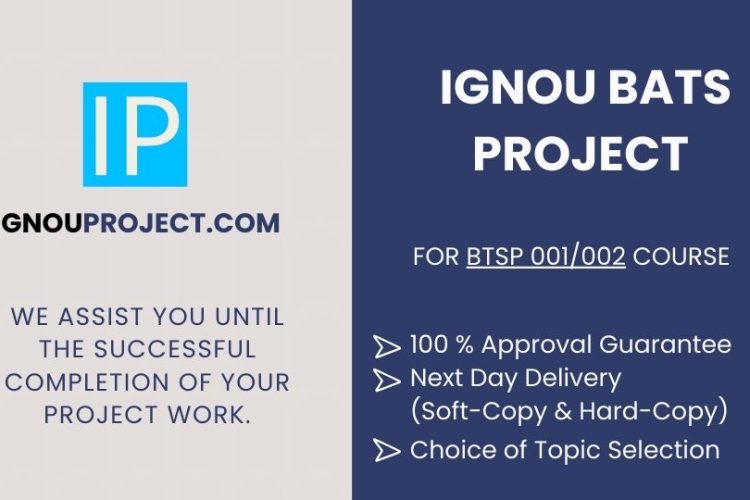
An IGNOU Project Guideline is a complete framework that helps students plan, execute, and submit their academic project or dissertation as part of their curriculum at Indira Gandhi National Open University (IGNOU). These requirements are critical for ensuring that the project satisfies the academic standards established by the university.
The IGNOU Project Guidelines often provides thorough directions for choosing a topic, conducting research, and constructing the project report. They specify the needed format, which often comprises parts like introduction, objectives, research methods, data analysis, findings, conclusion, and references. IGNOU also sets a word limit for the project report, establishes formatting requirements, and lists the papers that must be delivered with the final project.
What is the importance of the IGNOU Project Guidelines?
The IGNOU Project Guidelines play a crucial role in ensuring that students complete their academic projects or dissertations in a structured and professional manner. The importance of these guidelines lies in several key aspects:
- Clarity and Structure: The guidelines provide a clear framework for students to organize their research, helping them understand how to structure their project reports, from introduction to conclusion. This ensures uniformity and consistency in the submission of projects across different programs.
- Academic Standards: By following the guidelines, students adhere to the university’s academic standards, ensuring the quality of research is maintained. It helps in selecting appropriate research methodologies, data collection techniques, and ensuring proper referencing and citation, thus avoiding plagiarism.
- Timely Completion: The IGNOU Project guidelines provide timelines and deadlines for submitting proposals, project reports, and other required documents, helping students manage their time effectively and complete their projects on schedule.
- Ethical Research: The guidelines emphasize ethical considerations, such as obtaining consent for primary data collection and avoiding plagiarism, fostering responsible research practices.
- Evaluation and Grading: Adhering to the guidelines ensures that the project meets all the criteria for evaluation, increasing the likelihood of receiving better grades and a favorable assessment.
Are there any specific IGNOU Project Guidelines for selecting a project topic related to fieldwork or research?
Yes, there are specific guidelines for selecting a project topic related to fieldwork or research, particularly in academic programs like those at IGNOU. Here are some general guidelines to consider:
- Relevance: Choose a topic related to your field of study and program objectives. It should address current concerns, research gaps, or areas of interest within your discipline.
- Consider feasibility: Make sure the topic fits within your project’s scope. Consider the available resources, data, and time restrictions. Fieldwork should be realistic and manageable within the stated time frame.
- Originality: Choose a topic that brings unique insights or views to existing research. Avoid themes that are too broad or have already been widely addressed, unless you can bring a distinct perspective.
- Researchable: The topic should be researchable using current approaches and resources. Ensure that you have access to the appropriate data or can properly perform fieldwork.
- Ethical considerations: Ensure the topic and research techniques adhere to ethical norms. Obtain the relevant authorization if your research involves human participants, sensitive data, or requires fieldwork approval.
- Interest and Expertise: Choose a topic that aligns with your interests and expertise. This will keep you motivated and improve the overall quality of your research.
- Guidance from Supervisor: Consult your project supervisor or academic advisor before selecting a topic. They can provide helpful input and help you develop your topic so that it satisfies academic standards.
- Preliminary Literature Review: Analyze existing studies to find gaps and areas for new understanding.
- Alignment with Program Objectives: Ensure the topic meets the program or course’s requirements and objectives.
How many pages or words should your IGNOU project report be?
The length of an IGNOU project report, according to the IGNOU Project Guidelines, varies depending on the program and the specific rules offered for each course. However, generally speaking:
- Word Count: The project report typically ranges between 5,000 to 10,000 words, depending on the nature of the course and research topic. Some projects may have a higher word limit, especially for master’s programs.
- Page Count: The report usually spans 40 to 100 pages, including sections like the title page, acknowledgments, table of contents, references, and appendices.
Where to Submit the IGNOU Project?
Students are advised for the acceptance of this Project Guide about the project synopsis through electronic means by reaching from the Regional Centre through email. You can find the email address of your respective RC from IGNOU official website or you can Google it.
The IGNOU project reports could be submitted easily by the learners of IGNOU on the link given https://projects.ignou.ac.in/
And if you are submitting the project offline then you have to hard bind your project report with synopsis and speed post to IGNOU head office address which is in Maidan Garhi.
What is the format and structure for the IGNOU project report as per the IGNOU Project Guideline?
| Title Page | Includes the title of the project, student’s name, enrollment number, program code, study center, and the year of submission. |
| Acknowledgment | A section where you express gratitude to those who helped in your project (supervisor, family, colleagues, etc.). |
| Certificate of Authenticity | A declaration stating that the project is original and has not been submitted elsewhere, signed by both the student and the supervisor. |
| Table of Contents | Lists all sections and sub-sections with corresponding page numbers. |
| Abstract | A concise summary of the entire project, usually between 200-300 words, covering the objectives, methodology, and key findings. |
| Introduction | Provides an overview of the topic, background information, and the purpose of the research. It also outlines the objectives of the project. |
| Literature Review | Summarizes relevant research studies and theories related to the topic, providing context and justification for your research. |
| Research Methodology | Describes the research design, data collection methods (primary and/or secondary), sampling techniques, and tools used for analysis. |
| Data Analysis and Interpretation | Presents the collected data using charts, graphs, tables, etc., followed by a detailed interpretation of the results. |
| Findings and Discussion | Highlights the key outcomes of the research, and relates them to the objectives set out in the introduction. This section also includes an in-depth discussion of the findings. |
| Conclusion and Recommendations | Summarizes the research findings and provides recommendations or suggestions for future work, if applicable. |
| References/Bibliography | Lists all the sources cited in the project, following the prescribed citation style (APA, MLA, etc.). |
| Appendices | Contains any additional information such as questionnaires, interview guides, or extra data that supports the research but is not included in the main report. |
What are the consequences of not following the guidelines?
Failing to adhere to the IGNOU project guidelines can have several consequences, including:
- Rejection of the Project: If the project does not follow the prescribed format or guidelines, it may be rejected or returned for revisions, delaying your academic progress.
- Lower Grades: Non-compliance with guidelines can lead to lower evaluation scores. This affects the overall grade and academic performance.
- Loss of Marks: Specific sections or requirements that are not met might result in a direct loss of marks, impacting the final grade.
- Extended Submission Deadlines: Non-adherence can lead to extensions or resubmission requests, which might affect your graduation timeline.
- Increased Rework: You may need to spend additional time revising and resubmitting your project, which can be stressful and time-consuming.
- Impact on Supervisor Feedback: Ignoring guidelines can result in negative feedback from your supervisor, affecting the quality and acceptance of the final project.
- Ethical Issues: Failure to follow ethical IGNOU guidelines (like proper citation and data handling) can lead to serious academic integrity issues, including accusations of plagiarism.
- Delayed Degree Completion: Any issues with your project report can delay your degree completion and subsequent academic or career plans.
Check Out: IGNOU MBA Project
Are there any specific IGNOU Project guidelines for writing a project abstract?
Yes, there are specific guidelines for writing a project abstract that you should follow to ensure it effectively summarizes your research. Here’s how to craft a strong abstract for your IGNOU project:
- Conciseness: An abstract should be brief, typically between 200 to 300 words. It needs to convey the essence of your project in a compact form.
- Purpose: Clearly state the purpose of your research. Explain what prompted the study and what you aimed to achieve.
- Methodology: Briefly describe the research methods used. Include key aspects of your approach, such as data collection and analysis techniques, without going into excessive detail.
- Results: Summarize the main findings or results of your research. Highlight significant data and conclusions drawn from your study.
- Conclusions: Provide a concise overview of the implications of your findings. Explain how the results contribute to the field or suggest practical applications.
- Clarity: Write in clear, straightforward language. Avoid jargon and technical terms that may not be familiar to all readers.
- Relevance: Ensure that the abstract reflects the content of the project report accurately. It should be a standalone summary that provides a complete snapshot of the research.
- Structure: Organize the abstract in a logical order—typically starting with the purpose, followed by methodology, results, and then conclusions.
- Keywords: Although not always required, including a few keywords related to your project topic can help readers understand the focus of your research.
- Avoid: Do not include figures, tables, or detailed explanations. The abstract should provide a high-level overview, not a comprehensive explanation of the project.



